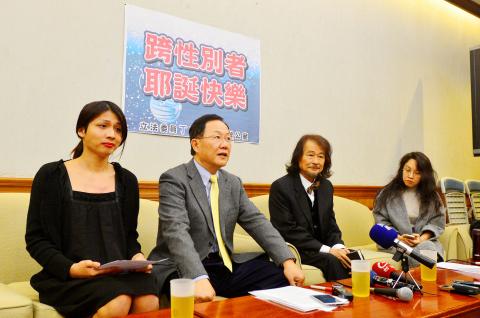People who wish to legally change their registered gender will soon no longer be required to undergo surgery before applying, the Ministry of the Interior said yesterday, marking a long-awaited victory for transgender rights advocates.
The ministry said it would soon terminate a controversial administrative order issued in 2008 that requires the surgical removal of gender-specific organs, as well as assessments from two psychiatrists, before a person is allowed to apply for gender reassignment.
Future applications for gender reassignment will be processed by a special committee that will include specialists on gender issues, psychiatrists and transgender representatives, long-time political activist Shih Ming-te (施明德) said yesterday at a news conference organized by transgender advocacy groups.

Photo: Wang Yi-sung, Taipei Times
According to the ministry’s current plans, applicants would be allowed to change their registered gender after they receive approval from the committee and wait through a required “hesitation period” of six months, Shih said, adding that applicants have to be over 18 years old.
Transgender rights advocates have long argued that a person’s gender should be based on self-identification rather than proof of surgery, and that the “inhumane” surgery requirement has forced many transgender people to undergo cheap, unsafe surgeries that have led to lasting injuries.
Led by Chinese Nationalist Party (KMT) Legislator Ting Shou-chung (丁守中), a motion demanding that the ministry abolish the administrative order received bipartisan support at the legislature’s plenary session on Tuesday.
Ting said that forcing transgender people to surgically remove their reproductive organs is a violation of human rights.
In response, the interior ministry promised to abolish the order within one month, adding that it would formulate alternative criteria for gender reassignment applications with the Ministry of Health and Welfare.
An 18-year-old transgender activist known as Miss Wu (吳小姐), who was born male, but identifies as a transgender woman, said that transgender people encounter numerous difficulties as a result of their registered gender being different from the one they identify with.
“This is a very good Christmas present for me,” she said.
Other transgender activists have cited difficulties in applying for dormitory places or employment opportunities, as well as ridicule from others because of their choices in clothing and self-expression.
The reform signals a major step forward in better protecting the rights of transgender people, the Intersex, Transgender and Transsexual People Care Association said in a statement.

A preclearance service to facilitate entry for people traveling to select airports in Japan would be available from Thursday next week to Feb. 25 at Taiwan Taoyuan International Airport, Taoyuan International Airport Corp (TIAC) said on Tuesday. The service was first made available to Taiwanese travelers throughout the winter vacation of 2024 and during the Lunar New Year holiday. In addition to flights to the Japanese cities of Hakodate, Asahikawa, Akita, Sendai, Niigata, Okayama, Takamatsu, Kumamoto and Kagoshima, the service would be available to travelers to Kobe and Oita. The service can be accessed by passengers of 15 flight routes operated by

Chinese spouse and influencer Guan Guan’s (關關) residency permit has been revoked for repeatedly posting pro-China videos that threaten national security, the National Immigration Agency confirmed today. Guan Guan has said many controversial statements in her videos posted to Douyin (抖音), including “the red flag will soon be painted all over Taiwan” and “Taiwan is an inseparable part of China,” and expressing hope for expedited reunification. The agency last year received multiple reports alleging that Guan Guan had advocated for armed reunification. After verifying the reports, the agency last month issued a notice requiring her to appear and explain her actions. Guan

GIVE AND TAKE: Blood demand continues to rise each year, while fewer young donors are available due to the nation’s falling birthrate, a doctor said Blood donors can redeem points earned from donations to obtain limited edition Formosan black bear travel mugs, the Kaohsiung Blood Center said yesterday, as it announced a goal of stocking 20,000 units of blood prior to the Lunar New Year. The last month of the lunar year is National Blood Donation Month, when local centers seek to stockpile blood for use during the Lunar New Year holiday. The blood demand in southern Taiwan — including Tainan and Kaohsiung, as well as Chiayi, Pingtung, Penghu and Taitung counties — is about 2,000 units per day, the center said. The donation campaign aims to boost

The Central Weather Administration (CWA) said a magnitude 4.9 earthquake that struck off the coast of eastern Taiwan yesterday was an independent event and part of a stress-adjustment process. The earthquake occurred at 4:47pm, with its epicenter at sea about 45.4km south of Yilan County Hall at a depth of 5.9km, the CWA said. The quake's intensity, which gauges the actual effects of a temblor, was highest in several townships in Yilan and neighboring Hualien County, where it measured 4 on Taiwan's seven-tier intensity scale, the CWA said. Lin Po-yu (林柏佑), a division chief at the CWA's Seismological Center, told a news conference